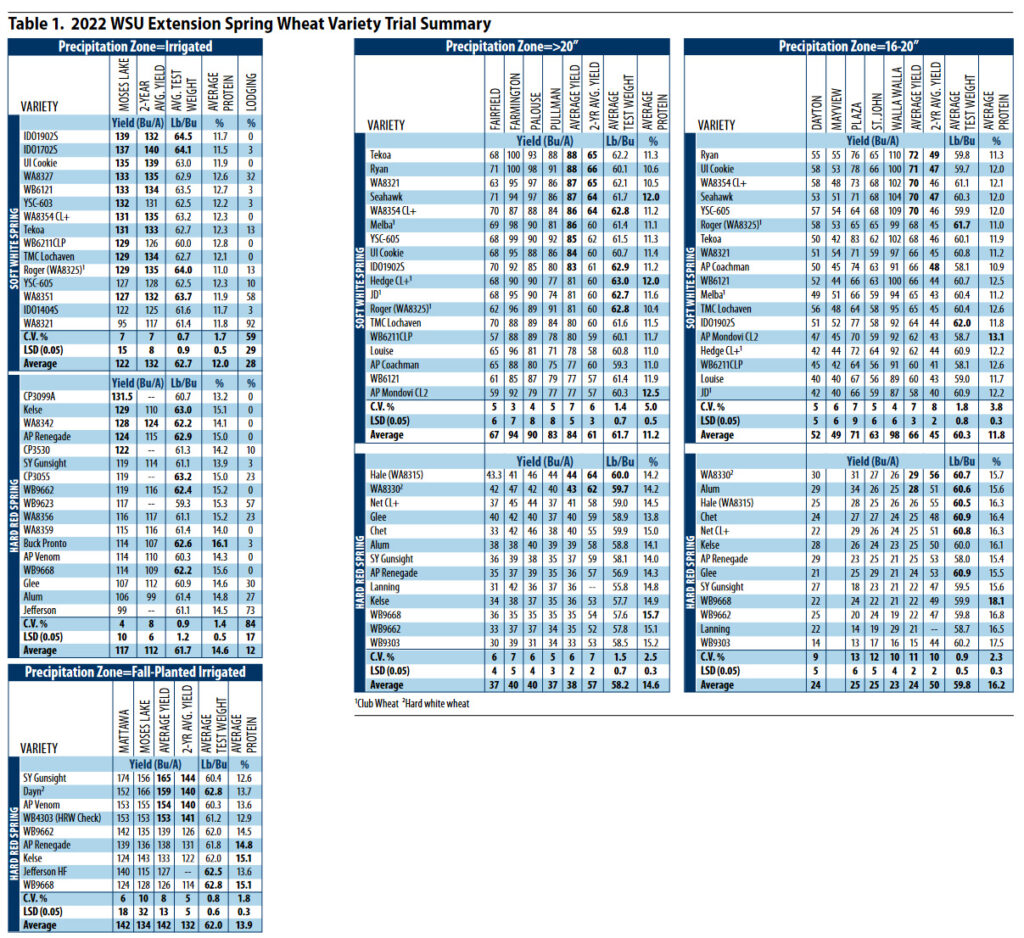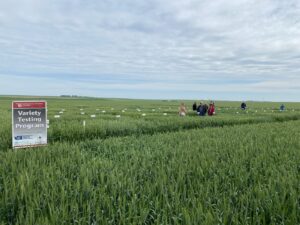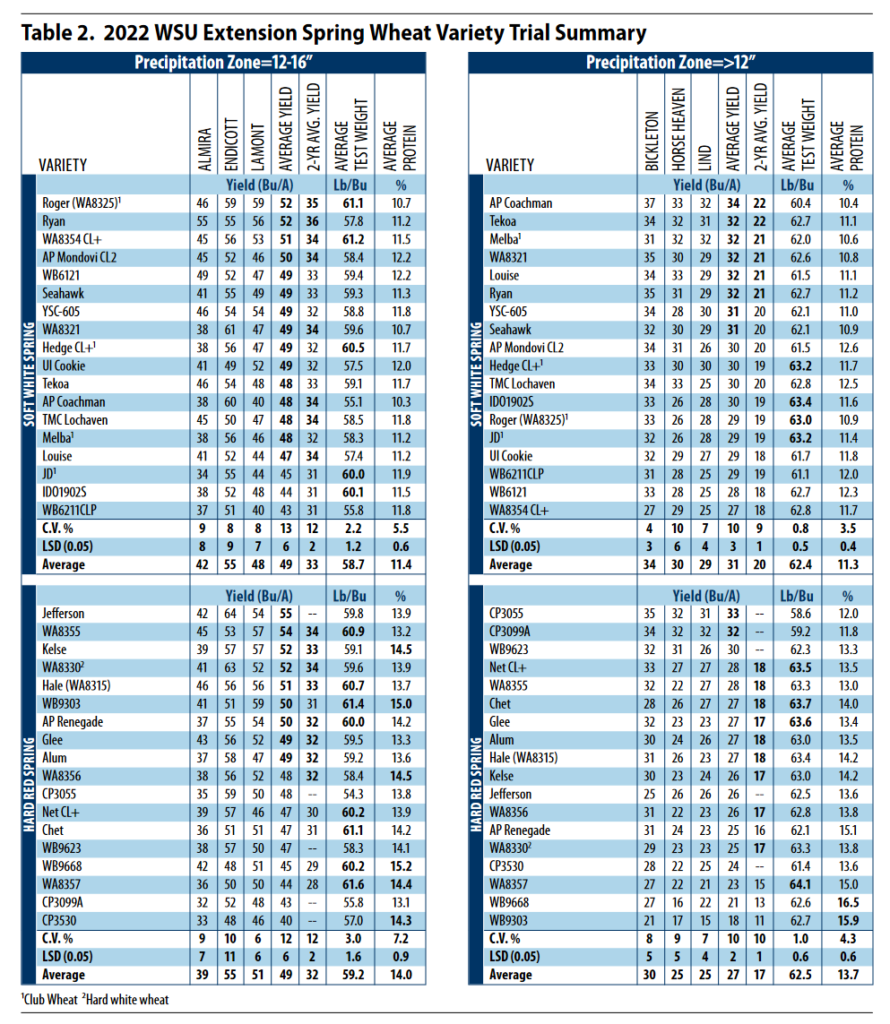By Clark Neely
The pendulum continues to swing back and forth for Washington spring wheat yields. After bumper yields in 2020 and historic drought in 2021, we saw a return to excellent yields for much of the state again in 2022. Yields and test weights were up across the board compared to 2021, which is no surprise. In fact, many yields in the high rainfall regions were competitive with the record yields seen in 2020. Some areas in the intermediate zone did miss out on some of the spring rains and therefore saw yields in those trials closer to average instead of above average. In the hard red spring trials, we saw grain protein between 0.2 and 1.1 percentage units higher compared to 2020. Walla Walla came in with the highest average trial yield at 98 bushels per acre, while Lind came in at the lowest with 29 bushels per acre. However, Lind did produce some impressive test weights, averaging 63.5 pounds per bushel, while Lamont came in with the lowest at just 56.5 pounds per bushel.
The dryland soft white spring trial consisted of 14 named varieties and 10 experimental lines while the hard red spring trial included 15 named and nine experimental lines in 2022. Of the named varieties, four were spring club wheats, one of which was named Roger (previously WA8325) in 2022. Roger is a Washington State University (WSU) variety that is the first spring club wheat with Hessian fly resistance. Roger will be available for commercial production in 2024.
The only other new named variety in the soft white spring trial in 2022 was TMC Lochaven from The McGregor Company, previously designated as TMC 2021. In 2022, TMC Lochaven generally landed near the trial average for both yield and test weight and more often than not had above-average grain protein. With the exception of the high rainfall zone, it tended to rank higher in 2021 for both yield and test weight as it held up to the dry conditions a little better than most, but grain protein remained higher than average.
 In 2022, Tekoa, Ryan and Seahawk continued to dominate the over-16-inch precipitation trials. Variety rankings were inconsistent across the soft white spring wheat trials in the 12-to-16-inch precipitation trials in 2022, and hence, there was very little statistical difference among varieties when averaged across all sites. Not surprisingly, AP Coachman, Tekoa, Melba, Louise and Ryan rounded out the top five in the lowest rainfall zone. UI Cookie had a notably good performance in the 16-to-20-inch zone, tying Ryan for the top spot. Roger outyielded Melba by three to four bushels per acre in the 12-to-16-inch and 16-to-20-inch precipitation zones, though Melba took the top spot for spring club wheats in the greater-than-20-inch and the less-than-12-inch precipitation zones.
In 2022, Tekoa, Ryan and Seahawk continued to dominate the over-16-inch precipitation trials. Variety rankings were inconsistent across the soft white spring wheat trials in the 12-to-16-inch precipitation trials in 2022, and hence, there was very little statistical difference among varieties when averaged across all sites. Not surprisingly, AP Coachman, Tekoa, Melba, Louise and Ryan rounded out the top five in the lowest rainfall zone. UI Cookie had a notably good performance in the 16-to-20-inch zone, tying Ryan for the top spot. Roger outyielded Melba by three to four bushels per acre in the 12-to-16-inch and 16-to-20-inch precipitation zones, though Melba took the top spot for spring club wheats in the greater-than-20-inch and the less-than-12-inch precipitation zones.
There has been substantially more change in the hard red spring trial lineup in 2022. Croplan entered new varieties CP3055, CP3099A and CP3530, while WestBred entered WB9623, and the University of Idaho entered Jefferson. WB9662, Lanning and SY Gunsight were all dropped out of the dryland locations.

As we look at each of these new varieties in 2022, CP3099A and WB9623 stood out as having the best yield potential, landing in the top group in two out of four dryland precipitation zones. Both landed below average in most cases for test weight; however, WB9623 maintained grain protein near average, while CP3099A was last in all zones. CP3055 had a good showing in the less-than-12-inch zone, while Jefferson was near the top in the 12-to-16-inch zone, but both were only average or below average in the other zones. Jefferson had consistently average test weight and protein, while CP3055 generally had one of the lowest test weights and at or below-average grain protein. CP3530 was generally last for yield in most cases and had below-average test weight. Under irrigation, Jefferson had some significant lodging as well as WB9623. Straw strength seemed decent to good on the remaining new varieties.
Hale, the most recent WSU hard red spring wheat release, was No. 1 in both the greater-than-20-inch and the 16-to-20-inch zones and was at or above average in the other two low precipitation zones. This made it the most consistently high-yielding variety in 2022. Seed for Hale should be widely available in 2024. Other varieties such as AP Renegade, Glee, Kelse and WB9303 were in and out of the top grouping and only rarely below average in the intermediate and higher rainfall regions. Net CL+, Chet and Alum continue to be reliable choices for the lowest rainfall regions as well. At Moses Lake (the sole 2022 irrigated site), both AP Venom and SY Gunsight, which have dominated the irrigated trials the past three years, did not perform as strongly in 2022, with both landing within two to three bushels per acre of the trial average, while Kelse and AP Renegade landed at the top.
This was just the second year the variety testing program has conducted fall-planted hard red spring wheat trials. These trials reflect the latest trend in acres towards fall-seeded spring wheat following late potato harvests. On the two year average, SY Gunsight and AP Venom tied the hard red winter wheat check WB4303 and hard white spring wheat Dayn for the best yielders. Of these, AP Venom and Dayn had about 0.5 percentage units higher grain protein. WB9668 came in last for yield on average. Severe cold damage occurred at the Mattawa irrigated site in 2022, which the wheat eventually grew out of, but gave an excellent opportunity to take cold tolerance ratings, which were very consistent across replications. SY Gunsight stood out as the most tolerant, showing no noticeable cold damage and was indistinguishable from the WB4303 hard red winter wheat check. AP Venom, WB9662 and AP Renegade all showed some minor damage, while WB9668 was mostly killed off back to the crown.
Looking into the future, there are a number of promising WSU experimental lines undergoing seed increases and are under consideration for future release. WA8354 CL+ would be a direct replacement for AP Mondovi CL2, which is the only other two-gene Clearfield soft white spring wheat tested, excluding Hedge CL+ club wheat. WA8354 CL+ generally yields three to seven bushels per acre more than AP Mondovi CL2 in the higher rainfall areas with two pounds per bushel better test weight and 1 to 1.5 percentage units lower grain protein. WA8321 has been in the trials for two years and commonly yields in the top group, along with above-average test weight and low protein. While 2022 was the very first year WA8351 was tested in the program, it ranked number one in every single precipitation zone last year, along with having the No. 1 or 2 test weight in every zone as well.
Results from the 2022 high rainfall and irrigated regional summaries can be found in Table 1, while the low rainfall summaries can be found in Table 2. When possible, growers are always encouraged to view multiple years and multiple locations of data for making varietal comparisons to better estimate the stability in varietal performance across environments. A good variety is one that can reliably perform well across multiple environments. This article includes a two-year average for most entries, but three and five-year averages are available online.
In coordination with other programs at WSU, University of Idaho and USDA-ARS, entries in the WSU Variety Testing Program are screened for disease resistance, insect resistance, acid soil tolerance, falling numbers, and end-use quality, among others. Be sure to check out these ratings in the final 2022 technical report on our small grains website, through our web-based variety selection tool or on the WSU Variety Selection tool mobile app. The Washington Grain Commission also publishes a Preferred Wheat Varieties brochure with end-use quality ratings for commercial varieties. If you have any questions or concerns, please feel free to contact me at [email protected] or (509) 335-1205.
Acknowledgements: Funding for supplies, travel and technical support for the WSU Extension Cereal Variety Testing Program is provided by the Washington Grain Commission. Facilities, salary, and equipment are provided by WSU administration. We are grateful for the many on-farm cooperators we partner with. They are essential for producing quality data and their donations of land, time and resources are appreciated.
This article originally appeared in the January 2023 issue of Wheat Life Magazine.

Clark Neely, Ph.D.
Clark Neely is the cereal variety testing lead and extension agronomist at Washington State University. His research interests include dryland cropping systems and advancing cereal variety testing. Read more about Dr. Neely.

